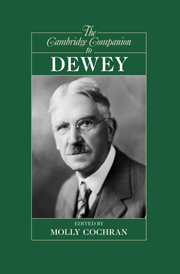Book contents
- Frontmatter
- Introduction
- 1 The making of a democratic philosopher: the intellectual development of John Dewey
- 2 Dewey’s epistemology
- 3 The naturalism of John Dewey
- 4 Dewey’s logic of inquiry
- 5 The primacy of practice in Dewey’s experimental empiricism
- 6 Cognitive science and Dewey’s theory of mind, thought, and language
- 7 John Dewey and action
- 8 Dewey’s moral philosophy
- 9 Ethics as moral inquiry: Dewey and the moral psychology of social reform
- 10 Dewey and pragmatic religious naturalism
- 11 Dewey’s aesthetics
- 12 Dewey’s philosophy of education: a critique from the perspective of care theory
- 13 Dewey’s vision of radical democracy
- 14 Dewey as an international thinker
- Bibliography
- Index
Introduction
Published online by Cambridge University Press: 28 September 2010
- Frontmatter
- Introduction
- 1 The making of a democratic philosopher: the intellectual development of John Dewey
- 2 Dewey’s epistemology
- 3 The naturalism of John Dewey
- 4 Dewey’s logic of inquiry
- 5 The primacy of practice in Dewey’s experimental empiricism
- 6 Cognitive science and Dewey’s theory of mind, thought, and language
- 7 John Dewey and action
- 8 Dewey’s moral philosophy
- 9 Ethics as moral inquiry: Dewey and the moral psychology of social reform
- 10 Dewey and pragmatic religious naturalism
- 11 Dewey’s aesthetics
- 12 Dewey’s philosophy of education: a critique from the perspective of care theory
- 13 Dewey’s vision of radical democracy
- 14 Dewey as an international thinker
- Bibliography
- Index
Summary
At the twenty-third Annual Conference of the National Association for the Advancement of Colored People in 1932, John Dewey addressed his audience on the topic of the Great Depression. He highlighted the opportunity for more expansive democratic change that the economic crisis represented: “The paradise of folly in which we have been living has broken down. That at least is some gain. It is something to become aware of the need for new ideas, new measures, new policies, new leaders, to bring about a great social reconstruction. More specifically, I think our depression has compelled us to think more fundamentally on social matters, economic matters, political matters, than we have been thinking for many years.” / As I write the introduction to this volume, the United States President Barack Obama has just reached his one-hundredth day in office. President Obama sees in this moment of global economic crisis, as Dewey did in 1932, an opportunity to push something akin to a “reset” button. In his Inaugural Address, Obama stated that the country must “begin again the work of remaking America.” The approach he offers resonates with that of Dewey.
- Type
- Chapter
- Information
- The Cambridge Companion to Dewey , pp. 1 - 12Publisher: Cambridge University PressPrint publication year: 2010
- 5
- Cited by

